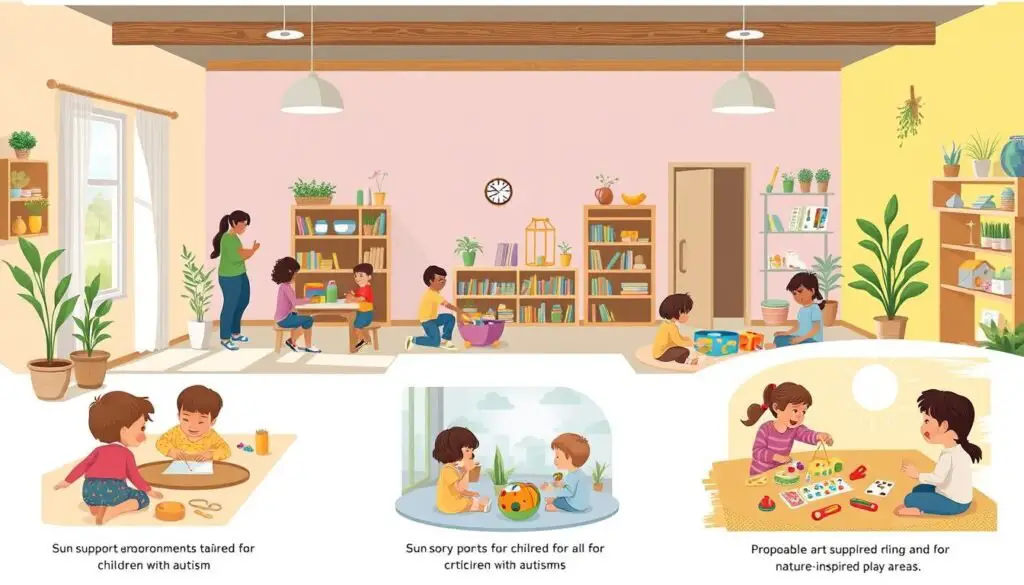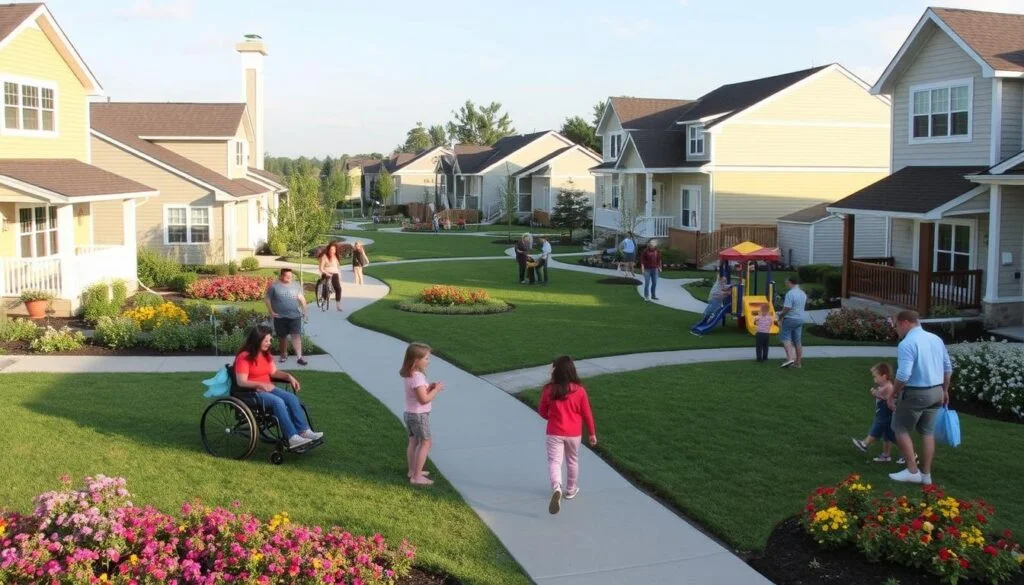Families with members on the autism spectrum face special challenges. But, there are many housing grants and support options to help them. These resources can change lives by addressing autism and housing needs.

Key Takeaways
- Housing grants and assistance programs tailored for families with autism
- Understanding the unique housing challenges faced by the autism community
- Exploring federal, state, and local government aid for autism families
- Leveraging non-profit organizations and charities for additional support
- Strategies for finding autism-friendly living environments
Understanding Autism and Its Impact on Housing Needs
Autism Spectrum Disorder (ASD) is a complex condition that affects how people interact and process sensory information. Families with autistic members often need special housing to meet their needs.
What is Autism Spectrum Disorder?
Autism is a lifelong condition with a wide range of symptoms and severity. People with ASD may struggle with social interaction, communication, and sensory processing. These challenges can affect their daily lives, including their housing needs.
Unique Housing Challenges for Families with Autism
- Sensory processing issues: Autistic individuals may be highly sensitive to certain sensory stimuli, such as noise, lighting, or textures, which can make traditional living spaces overwhelming or even distressing.
- Need for specialized spaces: Many autistic people require dedicated rooms or areas for activities like sensory integration, social skills training, or quiet relaxation to manage their symptoms effectively.
- Safety considerations: Families with autistic members often need to ensure their living environment is secure and safe, with features like fenced yards, locked doors, and limited access to hazardous areas.
- Accessibility and adaptability: Flexible and adaptable housing solutions are crucial to accommodate the changing needs of individuals with autism as they grow and develop.
Understanding the unique housing challenges faced by families with autism is the first step in identifying the appropriate autism housing assistance, special needs family grants, and other autism support programs. These resources can provide the necessary autism family resources and subsidized housing for autism.
housing grants for families with autism
Finding affordable housing for families with autism can be tough. But, there are many grants and programs to help. These are available at the federal, state, and local levels. They ensure people with autism and their families have a place to live that’s both comfortable and supportive.
The U.S. Department of Housing and Urban Development (HUD) has the Section 8 Housing Choice Voucher Program. It gives rent subsidies to low-income families, including those with disabilities. The HOME Investment Partnerships Program, also by HUD, helps states and local governments build affordable housing.
- The Section 8 Housing Choice Voucher Program helps cover the cost of rent, making it more affordable for families with autistic members.
- The HOME Investment Partnerships Program provides financial assistance to state and local governments to create and maintain accessible, low-income housing units.
States and local areas also have their own housing grants for autism families. These can include help with rent, home modifications, and special housing. For example, some states use Medicaid waivers for home adaptations or assistive technology. This makes homes more suitable for those with autism.
“The right home can make all the difference in the world for a family with a member on the autism spectrum. These housing grants provide a vital lifeline to ensure they have a safe, comfortable, and supportive living space.”
Finding the right housing grants and financial help can be hard. But, with the right info and help, families can find the support they need. This creates a caring and welcoming home for their autistic loved ones.
Navigating Government Housing Assistance Programs
Finding housing help for families with autism can seem hard. But, with the right info, families can get the support they need. Let’s look at the main federal, state, and local programs that help families with autism find affordable homes.
Federal Housing Assistance Options
At the federal level, there are programs for housing help for people with disabilities, like autism. The Section 8 Housing Choice Voucher Program helps families pay for private housing. The Public Housing Program offers affordable housing managed by local authorities. These programs are key in helping families with autism find good homes.
State and Local Housing Assistance Initiatives
States and local governments also have their own housing help for autism. They offer disability housing subsidies, specialized rental assistance, and subsidized housing for autism. Families should check what government aid for autism families is available in their area. This way, they can find all the assistance for families with autistic members.
| Program | Description | Eligibility |
|---|---|---|
| Section 8 Housing Choice Voucher | Provides rental subsidies to low-income families, including those with members with disabilities. | Households with income below 50% of the area median income. |
| Public Housing Program | Offers affordable rental units managed by local housing authorities. | Households with income below 80% of the area median income. |
| State Disability Housing Subsidies | Provides financial assistance for accessible and suitable housing for individuals with autism and other disabilities. | Varies by state and local program requirements. |
By looking into disability housing subsidies and subsidized housing for autism, families can find the government aid for autism families they need. This aid helps them get safe, comfortable, and accessible homes.
Exploring Non-Profit Organizations and Charities
Families with autism members can get help from non-profit groups and charities. These groups offer many services, like finding housing and getting funding. They also help build a strong support network.
Autism Speaks is a leading group. They have the Autism Housing Network. It helps families find autism-friendly homes and resources. The network has a list of housing, grants, and tips for finding homes.
- The Autism Housing Network has a big online directory of housing, grants, and support services.
- Autism Speaks also has the Autism Response Team. It helps families find local resources and services.
- They also have the Autism Safety Project. It works to make living spaces safe and accessible for people with autism.
The Autism Society is another non-profit. They have local chapters that offer many support programs, including housing help. These chapters guide families in finding affordable, autism-friendly homes.
| Organization | Services Offered |
|---|---|
| Autism Speaks | Autism Housing Network, Autism Response Team, Autism Safety Project |
| The Autism Society | Local chapter-based support programs, including housing assistance |
By using the help of these non-profit groups, families can find a wide range of support. They get guidance and help in finding the right housing for their needs.

“These community-based organizations truly understand the challenges families face and are dedicated to providing the resources and support needed to create a safe, comfortable, and empowering living environment.”
Strategies for Finding Autism-Friendly Housing
Families with autism members face a big challenge when looking for housing. It’s important to find a place that meets their unique needs. Things like sensory-friendly design and being close to community resources can greatly improve their quality of life.
Considerations for Suitable Living Environments
When searching for autism-friendly housing, families should look for certain things:
- Sensory-Friendly Design: A quiet and calm living space is key for those with autism.
- Safety and Security Features: Homes should have secure doors and windows for safety.
- Proximity to Community Resources: Being close to schools and healthcare is very helpful.
- Flexible and Adaptable Environments: Homes should be able to change as needs grow.
By focusing on these factors, families can find housing that truly supports their loved ones with autism.
“The right living environment can make a world of difference in the life of an individual with autism, empowering them to thrive and fostering a sense of comfort and belonging.”
| Feature | Importance for Autism-Friendly Housing |
|---|---|
| Sensory-Friendly Design | Reduces sensory overload and creates a calming living space |
| Safety and Security | Provides a secure and protective environment for individuals with autism |
| Proximity to Community Resources | Ensures easy access to essential services and supports for families |
| Flexible and Adaptable Environments | Allows for modifications as the needs of the individual with autism evolve |
Applying for Housing Grants and Subsidies
Getting financial help through housing grants and subsidies is key for families with autism. It’s vital to know what you need to apply and what documents are required. Being ready can help families get the support they need.
Application Requirements and Documentation
Applying for housing grants and subsidies has several steps and documents. Families should be prepared to provide:
- Proof of household income, such as tax returns or pay stubs
- Proof of disability, including a diagnosis or documentation from a healthcare provider
- Details about the family’s current living situation and housing needs
- Completed application forms for the specific grant or subsidy program
Many government aid for autism families and disability housing subsidies programs need extra documents. This includes identification, leases, or utility bills. Families should check the application requirements carefully to make sure they have everything needed.

Being proactive and organized can make the financial help for autistic households application easier. This way, families can increase their chances of getting the housing grants for families with autism they need.
Budgeting and Financial Planning for Families
Managing money for families with autism can feel overwhelming. But, with smart budgeting and planning, they can keep a safe home. This part talks about new ways to handle money and find help.
First, it’s important to know the costs of special housing. This includes mortgage or rent, home changes, and tech help. Families need to look at their budget closely. They should find ways to save money or find new ways to get funds.
| Cost Category | Average Annual Expense |
|---|---|
| Rent or Mortgage | $15,000 – $25,000 |
| Home Modifications | $5,000 – $15,000 |
| Assistive Technology | $1,000 – $5,000 |
| Utilities and Maintenance | $5,000 – $10,000 |
Families can also look for financial help for autistic households and assistance for families with autistic members. There are government programs, non-profits, and local groups that offer help. They might give grants, subsidies, or low-interest loans.
- Look into federal and state housing help, like the Section 8 program and state programs.
- Contact non-profits that help with financial help for autistic households, like disability groups and support services.
- Work with local officials to find city or county help for families with autistic members.
By budgeting well, planning ahead, and using assistance for families with autistic members, families can make a safe home. This home will meet the special needs of their autistic family members.
Legal Rights and Advocacy for Autism Housing
Families with autistic members often face challenges in finding housing. There are legal protections and resources to help. These ensure families get the government aid for autism families and disability housing subsidies they need.
Fair Housing Act and Disability Discrimination Laws
The Fair Housing Act protects against housing discrimination for those with autism. It means landlords can’t deny housing to autistic individuals. They must also make reasonable changes to ensure equal access.
The Americans with Disabilities Act (ADA) and the Rehabilitation Act of 1973 offer more protection. These laws ensure assistance for families with autistic members in accessing housing.
Families should know their rights and advocate for their housing needs. This might involve working with disability rights groups or filing complaints with HUD if faced with discrimination.
“Autism families deserve access to safe, affordable, and accommodating housing. Knowing and asserting your legal rights is crucial in obtaining the support you need.”
By understanding and using their legal rights, families can overcome housing challenges. They can secure the disability housing subsidies and government aid for autism families they need.

Building a Support Network for Autism Families
Finding housing for families with autism can be tough. But, having a strong support network can really help. By connecting with autism support programs locally, families can find many resources and support from others who understand.
Joining autism family resources groups is a great idea. Here, families can share their experiences and learn from each other. These groups often have workshops, help connect with local services, and fight for better housing for autism families.
Also, working with local advocacy groups can change things. These groups fight hard to make sure people with autism have the rights and housing they need. They help with housing policies and getting the right accommodations.
- Get in touch with your state or local autism advocacy groups to find out about their housing help and services.
- Go to community events and workshops hosted by these groups to meet other families and stay updated.
- Work with advocacy groups to share your housing concerns and help make policies that support autism families better.
By building a strong support network, families with autism can face housing challenges with confidence. They can find autism-friendly homes that meet their needs.
| Local Autism Support Programs | National Autism Family Resources |
|---|---|
| Autism Society of [State] Autism Speaks [State] Chapter [City] Autism Network | Autism Speaks Autism Society of America ASAN (Autistic Self Advocacy Network) |
Conclusion
In this guide, we’ve looked at housing grants and support for families with autism. We’ve seen how these help families create stable homes that meet their needs. This is crucial for those with autism.
It’s important for families to know their rights and build a strong support network. This way, they can overcome housing challenges. With the right help, families can get the financial support and accommodations they need.
Families with autistic members have many options. They can look into grants, support programs, and subsidies. By using these resources, families can find housing that supports their loved ones well.
FAQ
What is Autism Spectrum Disorder (ASD) and how does it impact housing needs?
Autism Spectrum Disorder (ASD) is a complex condition that affects how people communicate and interact. It also impacts how they process sensory information. Families with autistic members often need special housing that is sensory-friendly and close to community resources.
What are the main federal housing assistance options for families with autism?
Families with autism can get help from the government. Options include Section 8 vouchers, public housing, and HOME Investment Partnerships Program. These programs help with housing costs and make sure homes are accessible for autistic individuals.
How can state and local governments assist families with autism in finding suitable housing?
State and local governments have programs for autism housing. They offer rental assistance and subsidized housing. Families should look into what’s available in their area to get the help they need.
What role do non-profit organizations and charities play in supporting families with autism?
Non-profits and charities are key in helping families with autism. They provide grants, financial aid, and support networks. This helps families find the right housing and get funding.
What factors should families consider when searching for autism-friendly housing?
Families should look for housing that is safe and sensory-friendly. It should also be close to community resources. The living environment should meet the needs of autistic individuals.
What are the key steps in applying for housing grants and subsidies?
Applying for housing grants and subsidies requires specific steps. Families need to gather documents and meet eligibility criteria. They must show their financial need and how autism affects their housing situation.
How can families with autism effectively budget and plan their finances for housing?
Budgeting is key for families with autism. They should understand housing costs and manage their finances. Exploring financing options and getting financial advice can help secure housing.
What are the legal rights and advocacy tools available to families with autism when seeking housing?
Families with autism have legal protections in the housing market. They should know their rights and advocate for their needs. This ensures fair treatment and access to necessary accommodations.
How can families with autism build a strong support network?
A strong support network is vital for families with autism. Connecting with autism groups and resources can provide support and advice. It helps families face housing challenges together.
